Comprehensive Analysis: Brexit's Economic Impact on the United Kingdom
VerifiedAdded on 2020/07/23
|16
|3530
|34
Report
AI Summary
This report examines the economic ramifications of Brexit on the United Kingdom, focusing on its impact on foreign direct investment (FDI) and market dynamics. The analysis begins with an overview of Brexit and its various deal types, followed by an assessment of how Brexit is branding the UK as a destination for FDI. The report investigates the effects of FDI on the UK economy, highlighting the decline in investment and job risks in various sectors. The report also considers the potential damage to London's economic position and the shift of headquarters from the UK. It discusses government strategies to attract investment and maintain a single market policy, alongside recommendations for new investor strategies and trade policies. The report concludes with an evaluation of the government's efforts to maintain positive relationships with the EU and promote economic growth, providing a comprehensive understanding of Brexit's economic consequences.
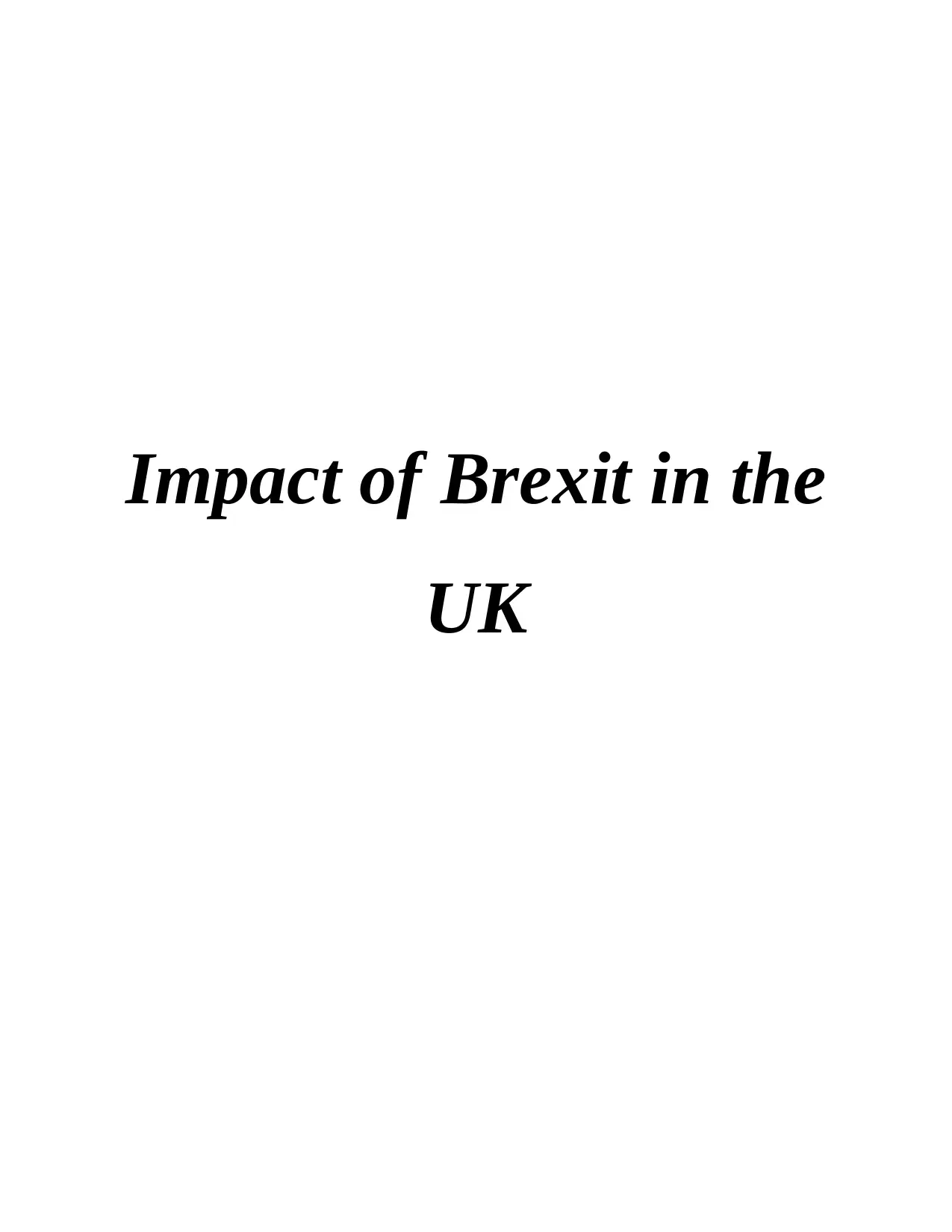
Impact of Brexit in the
UK
UK
Paraphrase This Document
Need a fresh take? Get an instant paraphrase of this document with our AI Paraphraser
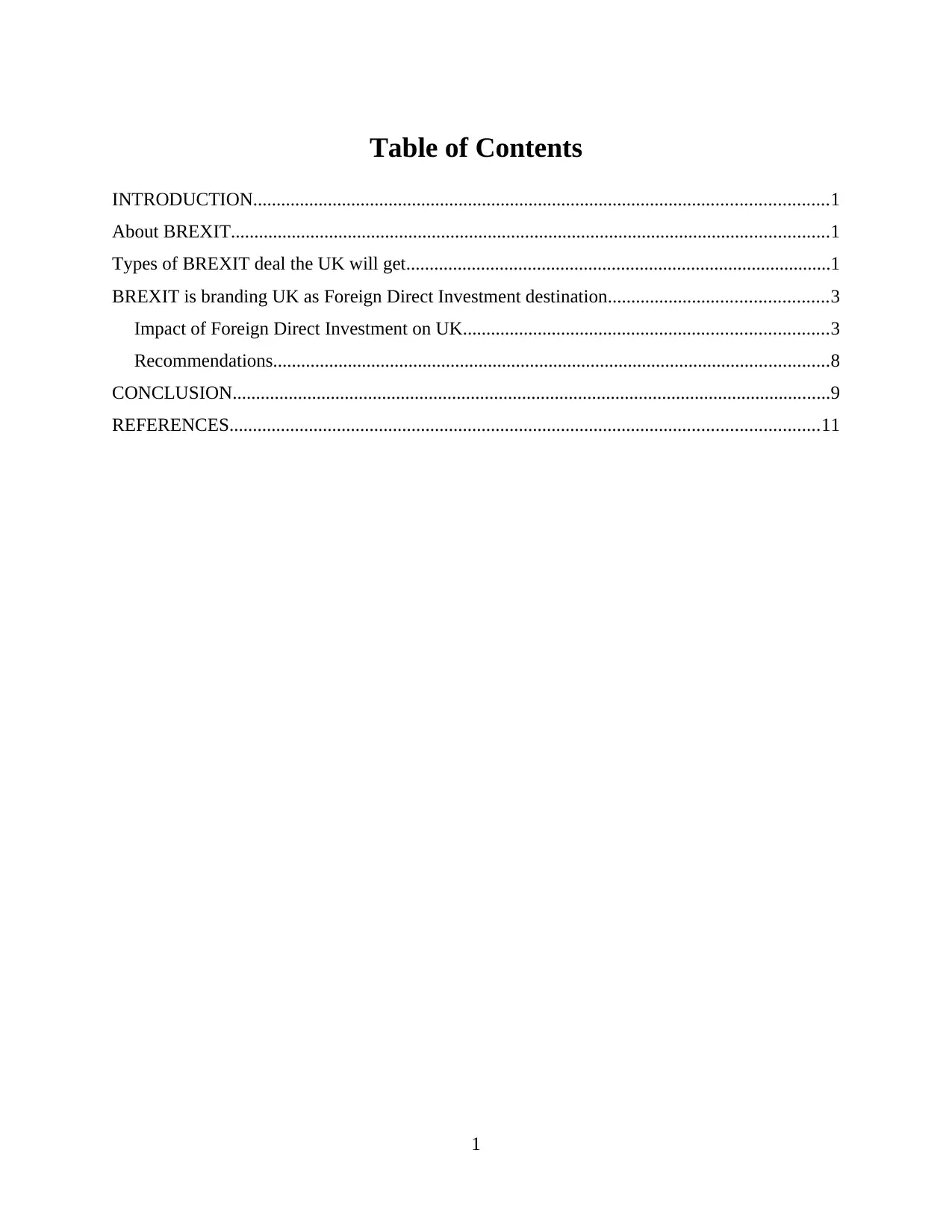
Table of Contents
INTRODUCTION...........................................................................................................................1
About BREXIT................................................................................................................................1
Types of BREXIT deal the UK will get...........................................................................................1
BREXIT is branding UK as Foreign Direct Investment destination...............................................3
Impact of Foreign Direct Investment on UK..............................................................................3
Recommendations.......................................................................................................................8
CONCLUSION................................................................................................................................9
REFERENCES..............................................................................................................................11
1
INTRODUCTION...........................................................................................................................1
About BREXIT................................................................................................................................1
Types of BREXIT deal the UK will get...........................................................................................1
BREXIT is branding UK as Foreign Direct Investment destination...............................................3
Impact of Foreign Direct Investment on UK..............................................................................3
Recommendations.......................................................................................................................8
CONCLUSION................................................................................................................................9
REFERENCES..............................................................................................................................11
1

2
⊘ This is a preview!⊘
Do you want full access?
Subscribe today to unlock all pages.

Trusted by 1+ million students worldwide
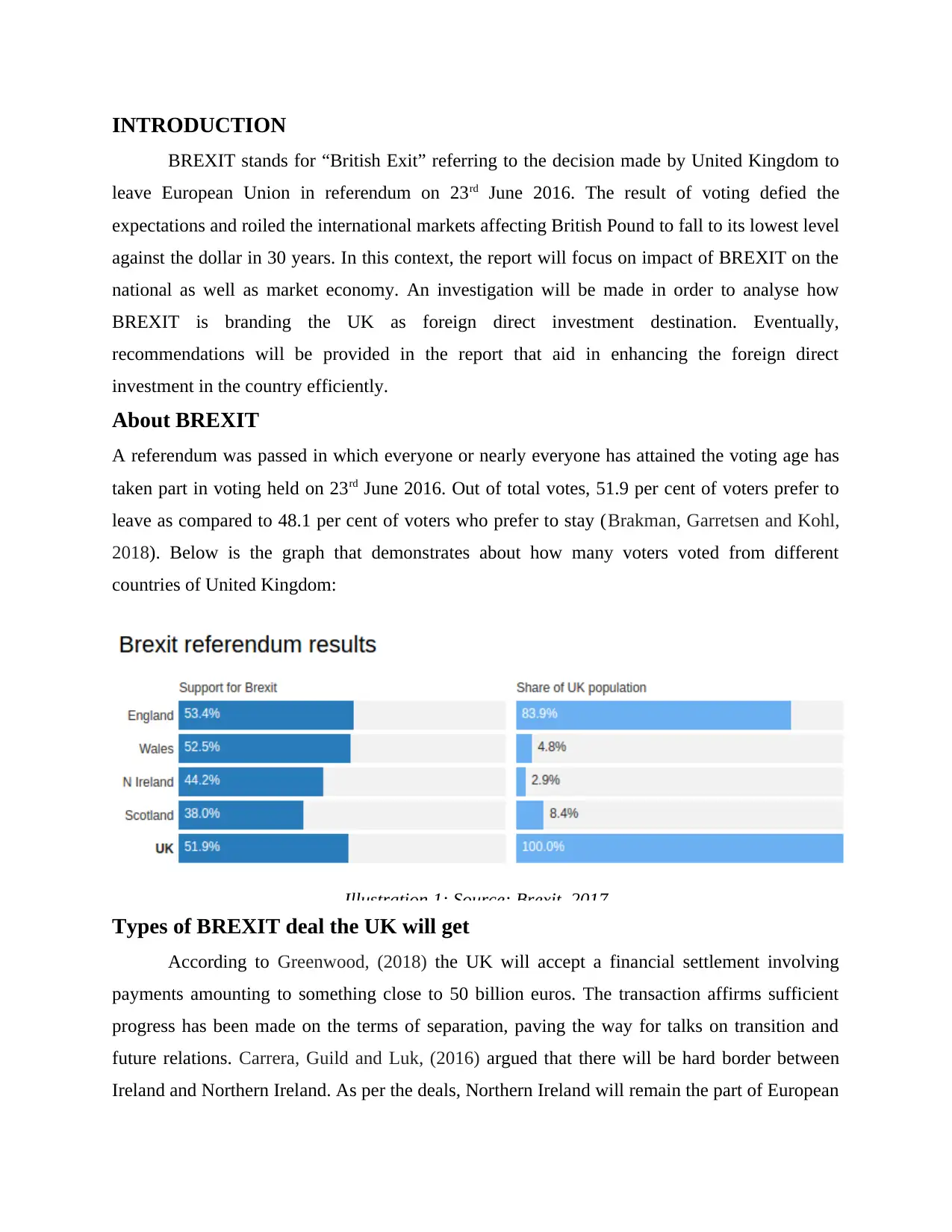
INTRODUCTION
BREXIT stands for “British Exit” referring to the decision made by United Kingdom to
leave European Union in referendum on 23rd June 2016. The result of voting defied the
expectations and roiled the international markets affecting British Pound to fall to its lowest level
against the dollar in 30 years. In this context, the report will focus on impact of BREXIT on the
national as well as market economy. An investigation will be made in order to analyse how
BREXIT is branding the UK as foreign direct investment destination. Eventually,
recommendations will be provided in the report that aid in enhancing the foreign direct
investment in the country efficiently.
About BREXIT
A referendum was passed in which everyone or nearly everyone has attained the voting age has
taken part in voting held on 23rd June 2016. Out of total votes, 51.9 per cent of voters prefer to
leave as compared to 48.1 per cent of voters who prefer to stay (Brakman, Garretsen and Kohl,
2018). Below is the graph that demonstrates about how many voters voted from different
countries of United Kingdom:
Types of BREXIT deal the UK will get
According to Greenwood, (2018) the UK will accept a financial settlement involving
payments amounting to something close to 50 billion euros. The transaction affirms sufficient
progress has been made on the terms of separation, paving the way for talks on transition and
future relations. Carrera, Guild and Luk, (2016) argued that there will be hard border between
Ireland and Northern Ireland. As per the deals, Northern Ireland will remain the part of European
Illustration 1: Source: Brexit. 2017
BREXIT stands for “British Exit” referring to the decision made by United Kingdom to
leave European Union in referendum on 23rd June 2016. The result of voting defied the
expectations and roiled the international markets affecting British Pound to fall to its lowest level
against the dollar in 30 years. In this context, the report will focus on impact of BREXIT on the
national as well as market economy. An investigation will be made in order to analyse how
BREXIT is branding the UK as foreign direct investment destination. Eventually,
recommendations will be provided in the report that aid in enhancing the foreign direct
investment in the country efficiently.
About BREXIT
A referendum was passed in which everyone or nearly everyone has attained the voting age has
taken part in voting held on 23rd June 2016. Out of total votes, 51.9 per cent of voters prefer to
leave as compared to 48.1 per cent of voters who prefer to stay (Brakman, Garretsen and Kohl,
2018). Below is the graph that demonstrates about how many voters voted from different
countries of United Kingdom:
Types of BREXIT deal the UK will get
According to Greenwood, (2018) the UK will accept a financial settlement involving
payments amounting to something close to 50 billion euros. The transaction affirms sufficient
progress has been made on the terms of separation, paving the way for talks on transition and
future relations. Carrera, Guild and Luk, (2016) argued that there will be hard border between
Ireland and Northern Ireland. As per the deals, Northern Ireland will remain the part of European
Illustration 1: Source: Brexit. 2017
Paraphrase This Document
Need a fresh take? Get an instant paraphrase of this document with our AI Paraphraser
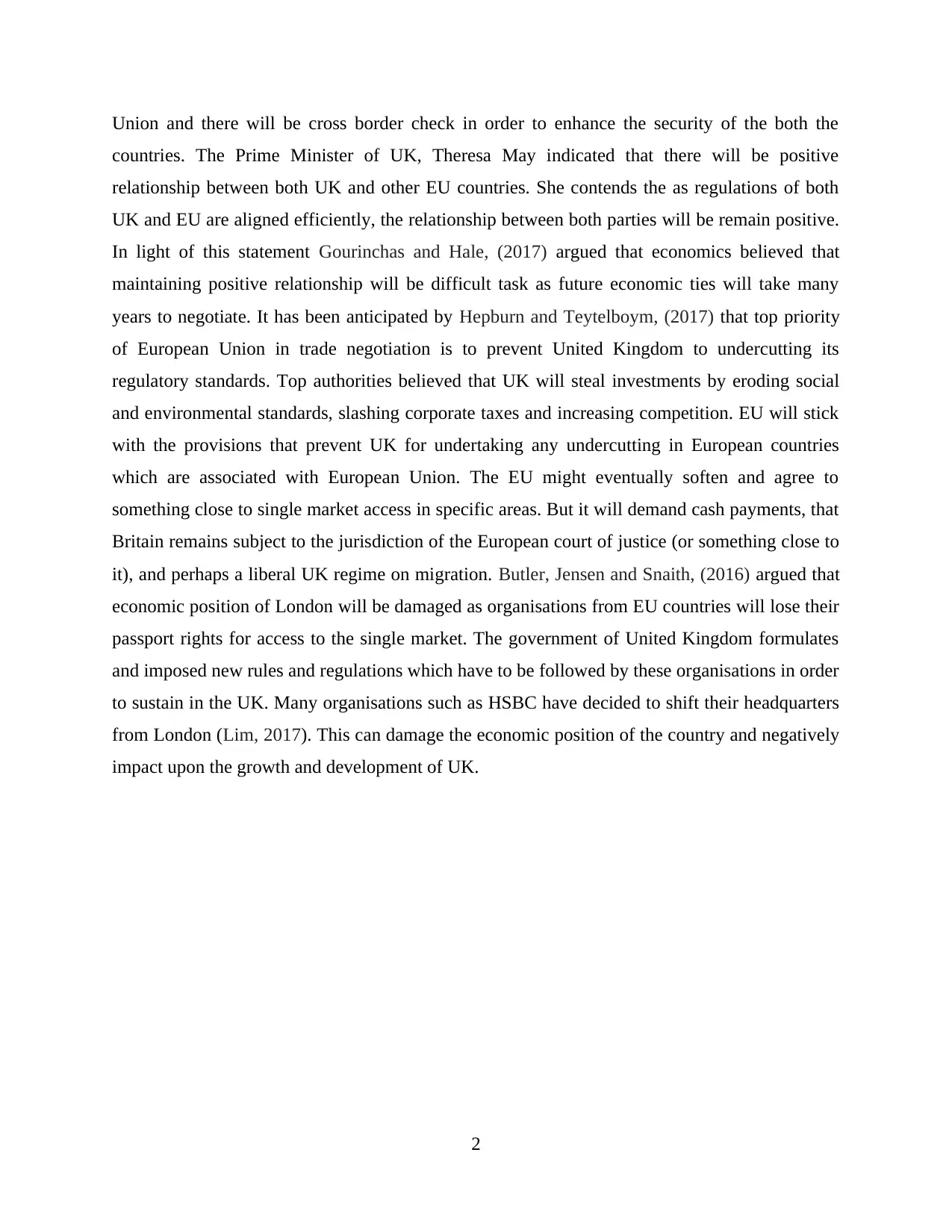
Union and there will be cross border check in order to enhance the security of the both the
countries. The Prime Minister of UK, Theresa May indicated that there will be positive
relationship between both UK and other EU countries. She contends the as regulations of both
UK and EU are aligned efficiently, the relationship between both parties will be remain positive.
In light of this statement Gourinchas and Hale, (2017) argued that economics believed that
maintaining positive relationship will be difficult task as future economic ties will take many
years to negotiate. It has been anticipated by Hepburn and Teytelboym, (2017) that top priority
of European Union in trade negotiation is to prevent United Kingdom to undercutting its
regulatory standards. Top authorities believed that UK will steal investments by eroding social
and environmental standards, slashing corporate taxes and increasing competition. EU will stick
with the provisions that prevent UK for undertaking any undercutting in European countries
which are associated with European Union. The EU might eventually soften and agree to
something close to single market access in specific areas. But it will demand cash payments, that
Britain remains subject to the jurisdiction of the European court of justice (or something close to
it), and perhaps a liberal UK regime on migration. Butler, Jensen and Snaith, (2016) argued that
economic position of London will be damaged as organisations from EU countries will lose their
passport rights for access to the single market. The government of United Kingdom formulates
and imposed new rules and regulations which have to be followed by these organisations in order
to sustain in the UK. Many organisations such as HSBC have decided to shift their headquarters
from London (Lim, 2017). This can damage the economic position of the country and negatively
impact upon the growth and development of UK.
2
countries. The Prime Minister of UK, Theresa May indicated that there will be positive
relationship between both UK and other EU countries. She contends the as regulations of both
UK and EU are aligned efficiently, the relationship between both parties will be remain positive.
In light of this statement Gourinchas and Hale, (2017) argued that economics believed that
maintaining positive relationship will be difficult task as future economic ties will take many
years to negotiate. It has been anticipated by Hepburn and Teytelboym, (2017) that top priority
of European Union in trade negotiation is to prevent United Kingdom to undercutting its
regulatory standards. Top authorities believed that UK will steal investments by eroding social
and environmental standards, slashing corporate taxes and increasing competition. EU will stick
with the provisions that prevent UK for undertaking any undercutting in European countries
which are associated with European Union. The EU might eventually soften and agree to
something close to single market access in specific areas. But it will demand cash payments, that
Britain remains subject to the jurisdiction of the European court of justice (or something close to
it), and perhaps a liberal UK regime on migration. Butler, Jensen and Snaith, (2016) argued that
economic position of London will be damaged as organisations from EU countries will lose their
passport rights for access to the single market. The government of United Kingdom formulates
and imposed new rules and regulations which have to be followed by these organisations in order
to sustain in the UK. Many organisations such as HSBC have decided to shift their headquarters
from London (Lim, 2017). This can damage the economic position of the country and negatively
impact upon the growth and development of UK.
2
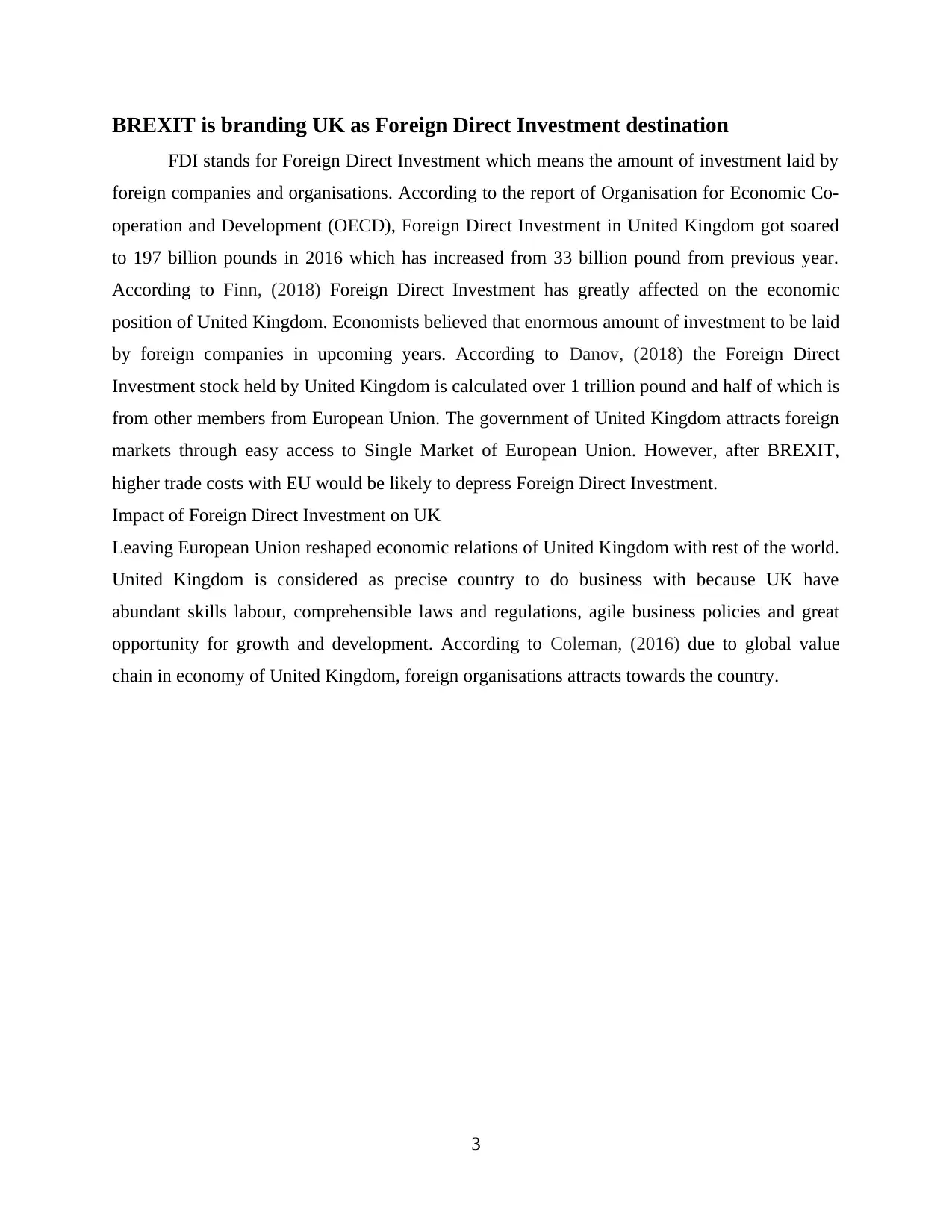
BREXIT is branding UK as Foreign Direct Investment destination
FDI stands for Foreign Direct Investment which means the amount of investment laid by
foreign companies and organisations. According to the report of Organisation for Economic Co-
operation and Development (OECD), Foreign Direct Investment in United Kingdom got soared
to 197 billion pounds in 2016 which has increased from 33 billion pound from previous year.
According to Finn, (2018) Foreign Direct Investment has greatly affected on the economic
position of United Kingdom. Economists believed that enormous amount of investment to be laid
by foreign companies in upcoming years. According to Danov, (2018) the Foreign Direct
Investment stock held by United Kingdom is calculated over 1 trillion pound and half of which is
from other members from European Union. The government of United Kingdom attracts foreign
markets through easy access to Single Market of European Union. However, after BREXIT,
higher trade costs with EU would be likely to depress Foreign Direct Investment.
Impact of Foreign Direct Investment on UK
Leaving European Union reshaped economic relations of United Kingdom with rest of the world.
United Kingdom is considered as precise country to do business with because UK have
abundant skills labour, comprehensible laws and regulations, agile business policies and great
opportunity for growth and development. According to Coleman, (2016) due to global value
chain in economy of United Kingdom, foreign organisations attracts towards the country.
3
FDI stands for Foreign Direct Investment which means the amount of investment laid by
foreign companies and organisations. According to the report of Organisation for Economic Co-
operation and Development (OECD), Foreign Direct Investment in United Kingdom got soared
to 197 billion pounds in 2016 which has increased from 33 billion pound from previous year.
According to Finn, (2018) Foreign Direct Investment has greatly affected on the economic
position of United Kingdom. Economists believed that enormous amount of investment to be laid
by foreign companies in upcoming years. According to Danov, (2018) the Foreign Direct
Investment stock held by United Kingdom is calculated over 1 trillion pound and half of which is
from other members from European Union. The government of United Kingdom attracts foreign
markets through easy access to Single Market of European Union. However, after BREXIT,
higher trade costs with EU would be likely to depress Foreign Direct Investment.
Impact of Foreign Direct Investment on UK
Leaving European Union reshaped economic relations of United Kingdom with rest of the world.
United Kingdom is considered as precise country to do business with because UK have
abundant skills labour, comprehensible laws and regulations, agile business policies and great
opportunity for growth and development. According to Coleman, (2016) due to global value
chain in economy of United Kingdom, foreign organisations attracts towards the country.
3
⊘ This is a preview!⊘
Do you want full access?
Subscribe today to unlock all pages.

Trusted by 1+ million students worldwide
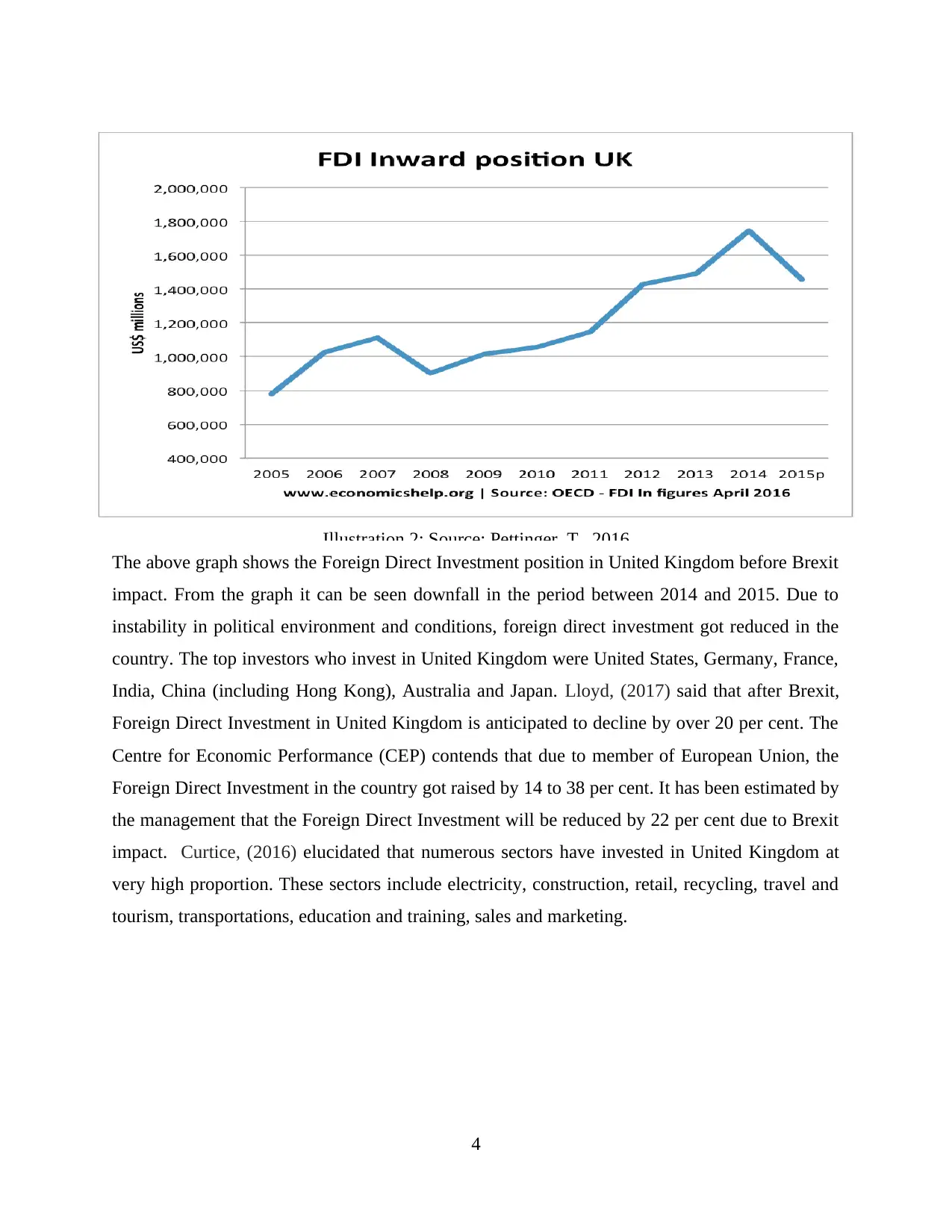
The above graph shows the Foreign Direct Investment position in United Kingdom before Brexit
impact. From the graph it can be seen downfall in the period between 2014 and 2015. Due to
instability in political environment and conditions, foreign direct investment got reduced in the
country. The top investors who invest in United Kingdom were United States, Germany, France,
India, China (including Hong Kong), Australia and Japan. Lloyd, (2017) said that after Brexit,
Foreign Direct Investment in United Kingdom is anticipated to decline by over 20 per cent. The
Centre for Economic Performance (CEP) contends that due to member of European Union, the
Foreign Direct Investment in the country got raised by 14 to 38 per cent. It has been estimated by
the management that the Foreign Direct Investment will be reduced by 22 per cent due to Brexit
impact. Curtice, (2016) elucidated that numerous sectors have invested in United Kingdom at
very high proportion. These sectors include electricity, construction, retail, recycling, travel and
tourism, transportations, education and training, sales and marketing.
4
Illustration 2: Source: Pettinger, T., 2016
impact. From the graph it can be seen downfall in the period between 2014 and 2015. Due to
instability in political environment and conditions, foreign direct investment got reduced in the
country. The top investors who invest in United Kingdom were United States, Germany, France,
India, China (including Hong Kong), Australia and Japan. Lloyd, (2017) said that after Brexit,
Foreign Direct Investment in United Kingdom is anticipated to decline by over 20 per cent. The
Centre for Economic Performance (CEP) contends that due to member of European Union, the
Foreign Direct Investment in the country got raised by 14 to 38 per cent. It has been estimated by
the management that the Foreign Direct Investment will be reduced by 22 per cent due to Brexit
impact. Curtice, (2016) elucidated that numerous sectors have invested in United Kingdom at
very high proportion. These sectors include electricity, construction, retail, recycling, travel and
tourism, transportations, education and training, sales and marketing.
4
Illustration 2: Source: Pettinger, T., 2016
Paraphrase This Document
Need a fresh take? Get an instant paraphrase of this document with our AI Paraphraser
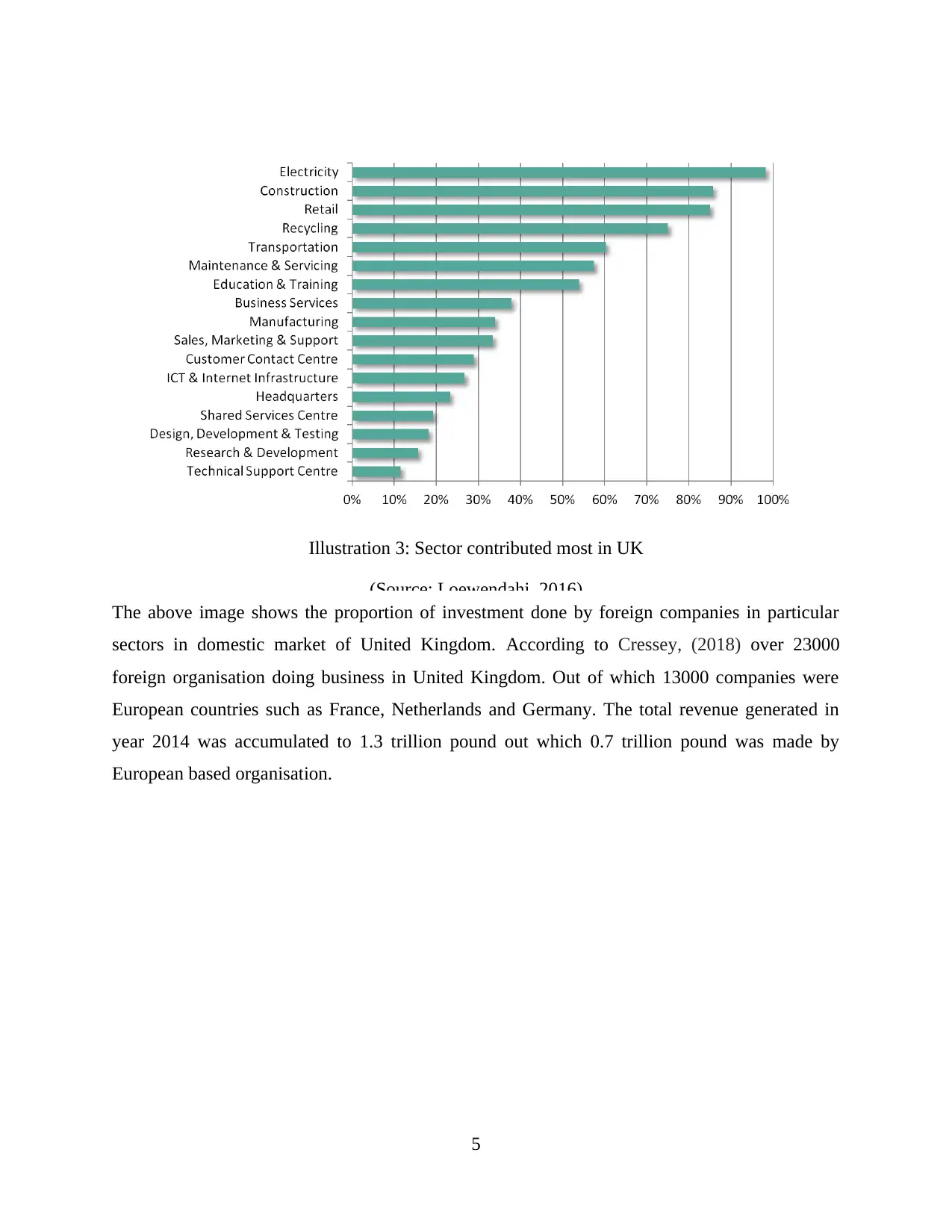
The above image shows the proportion of investment done by foreign companies in particular
sectors in domestic market of United Kingdom. According to Cressey, (2018) over 23000
foreign organisation doing business in United Kingdom. Out of which 13000 companies were
European countries such as France, Netherlands and Germany. The total revenue generated in
year 2014 was accumulated to 1.3 trillion pound out which 0.7 trillion pound was made by
European based organisation.
5
Illustration 3: Sector contributed most in UK
(Source: Loewendahi, 2016)
sectors in domestic market of United Kingdom. According to Cressey, (2018) over 23000
foreign organisation doing business in United Kingdom. Out of which 13000 companies were
European countries such as France, Netherlands and Germany. The total revenue generated in
year 2014 was accumulated to 1.3 trillion pound out which 0.7 trillion pound was made by
European based organisation.
5
Illustration 3: Sector contributed most in UK
(Source: Loewendahi, 2016)
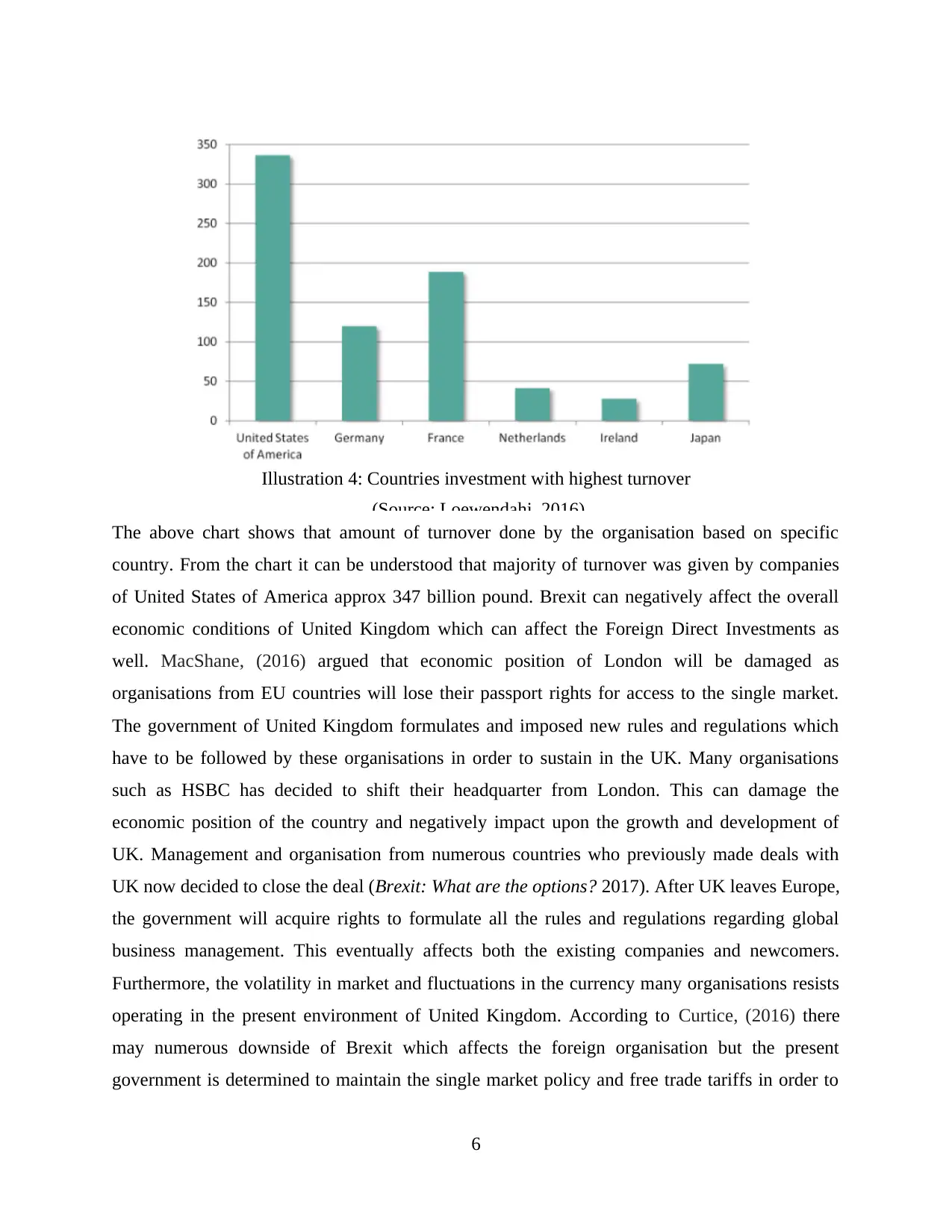
The above chart shows that amount of turnover done by the organisation based on specific
country. From the chart it can be understood that majority of turnover was given by companies
of United States of America approx 347 billion pound. Brexit can negatively affect the overall
economic conditions of United Kingdom which can affect the Foreign Direct Investments as
well. MacShane, (2016) argued that economic position of London will be damaged as
organisations from EU countries will lose their passport rights for access to the single market.
The government of United Kingdom formulates and imposed new rules and regulations which
have to be followed by these organisations in order to sustain in the UK. Many organisations
such as HSBC has decided to shift their headquarter from London. This can damage the
economic position of the country and negatively impact upon the growth and development of
UK. Management and organisation from numerous countries who previously made deals with
UK now decided to close the deal (Brexit: What are the options? 2017). After UK leaves Europe,
the government will acquire rights to formulate all the rules and regulations regarding global
business management. This eventually affects both the existing companies and newcomers.
Furthermore, the volatility in market and fluctuations in the currency many organisations resists
operating in the present environment of United Kingdom. According to Curtice, (2016) there
may numerous downside of Brexit which affects the foreign organisation but the present
government is determined to maintain the single market policy and free trade tariffs in order to
6
Illustration 4: Countries investment with highest turnover
(Source: Loewendahi, 2016)
country. From the chart it can be understood that majority of turnover was given by companies
of United States of America approx 347 billion pound. Brexit can negatively affect the overall
economic conditions of United Kingdom which can affect the Foreign Direct Investments as
well. MacShane, (2016) argued that economic position of London will be damaged as
organisations from EU countries will lose their passport rights for access to the single market.
The government of United Kingdom formulates and imposed new rules and regulations which
have to be followed by these organisations in order to sustain in the UK. Many organisations
such as HSBC has decided to shift their headquarter from London. This can damage the
economic position of the country and negatively impact upon the growth and development of
UK. Management and organisation from numerous countries who previously made deals with
UK now decided to close the deal (Brexit: What are the options? 2017). After UK leaves Europe,
the government will acquire rights to formulate all the rules and regulations regarding global
business management. This eventually affects both the existing companies and newcomers.
Furthermore, the volatility in market and fluctuations in the currency many organisations resists
operating in the present environment of United Kingdom. According to Curtice, (2016) there
may numerous downside of Brexit which affects the foreign organisation but the present
government is determined to maintain the single market policy and free trade tariffs in order to
6
Illustration 4: Countries investment with highest turnover
(Source: Loewendahi, 2016)
⊘ This is a preview!⊘
Do you want full access?
Subscribe today to unlock all pages.

Trusted by 1+ million students worldwide
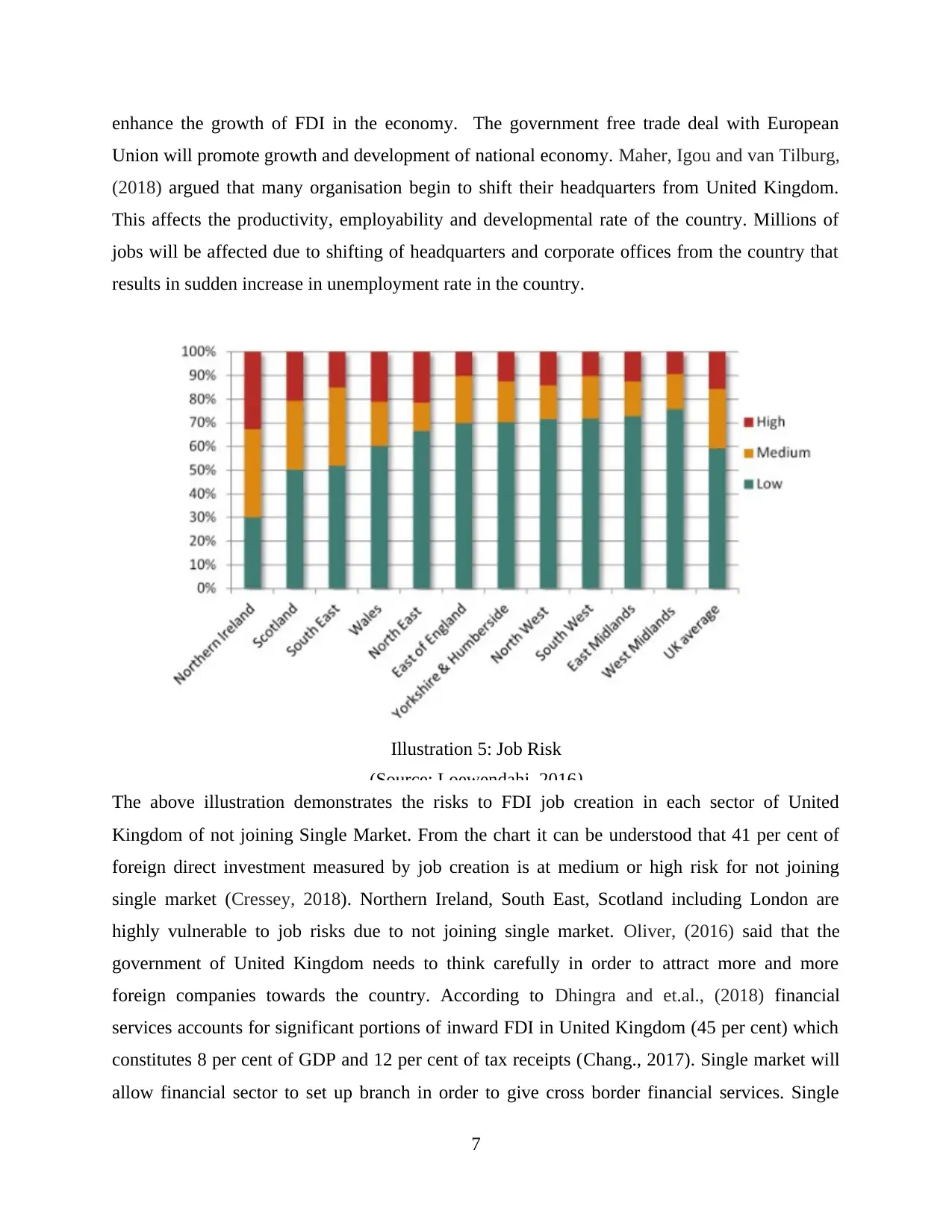
enhance the growth of FDI in the economy. The government free trade deal with European
Union will promote growth and development of national economy. Maher, Igou and van Tilburg,
(2018) argued that many organisation begin to shift their headquarters from United Kingdom.
This affects the productivity, employability and developmental rate of the country. Millions of
jobs will be affected due to shifting of headquarters and corporate offices from the country that
results in sudden increase in unemployment rate in the country.
The above illustration demonstrates the risks to FDI job creation in each sector of United
Kingdom of not joining Single Market. From the chart it can be understood that 41 per cent of
foreign direct investment measured by job creation is at medium or high risk for not joining
single market (Cressey, 2018). Northern Ireland, South East, Scotland including London are
highly vulnerable to job risks due to not joining single market. Oliver, (2016) said that the
government of United Kingdom needs to think carefully in order to attract more and more
foreign companies towards the country. According to Dhingra and et.al., (2018) financial
services accounts for significant portions of inward FDI in United Kingdom (45 per cent) which
constitutes 8 per cent of GDP and 12 per cent of tax receipts (Chang., 2017). Single market will
allow financial sector to set up branch in order to give cross border financial services. Single
7
Illustration 5: Job Risk
(Source: Loewendahi, 2016)
Union will promote growth and development of national economy. Maher, Igou and van Tilburg,
(2018) argued that many organisation begin to shift their headquarters from United Kingdom.
This affects the productivity, employability and developmental rate of the country. Millions of
jobs will be affected due to shifting of headquarters and corporate offices from the country that
results in sudden increase in unemployment rate in the country.
The above illustration demonstrates the risks to FDI job creation in each sector of United
Kingdom of not joining Single Market. From the chart it can be understood that 41 per cent of
foreign direct investment measured by job creation is at medium or high risk for not joining
single market (Cressey, 2018). Northern Ireland, South East, Scotland including London are
highly vulnerable to job risks due to not joining single market. Oliver, (2016) said that the
government of United Kingdom needs to think carefully in order to attract more and more
foreign companies towards the country. According to Dhingra and et.al., (2018) financial
services accounts for significant portions of inward FDI in United Kingdom (45 per cent) which
constitutes 8 per cent of GDP and 12 per cent of tax receipts (Chang., 2017). Single market will
allow financial sector to set up branch in order to give cross border financial services. Single
7
Illustration 5: Job Risk
(Source: Loewendahi, 2016)
Paraphrase This Document
Need a fresh take? Get an instant paraphrase of this document with our AI Paraphraser
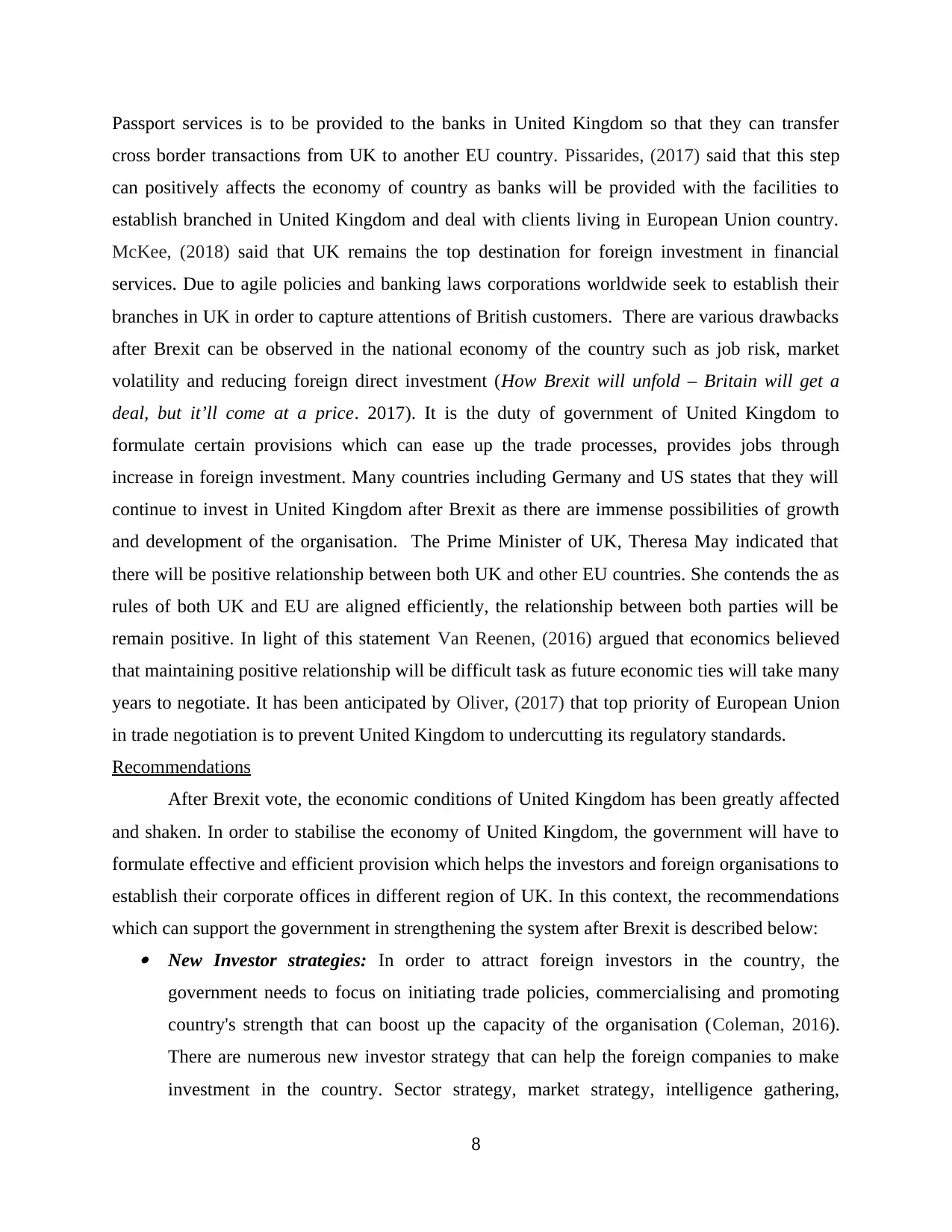
Passport services is to be provided to the banks in United Kingdom so that they can transfer
cross border transactions from UK to another EU country. Pissarides, (2017) said that this step
can positively affects the economy of country as banks will be provided with the facilities to
establish branched in United Kingdom and deal with clients living in European Union country.
McKee, (2018) said that UK remains the top destination for foreign investment in financial
services. Due to agile policies and banking laws corporations worldwide seek to establish their
branches in UK in order to capture attentions of British customers. There are various drawbacks
after Brexit can be observed in the national economy of the country such as job risk, market
volatility and reducing foreign direct investment (How Brexit will unfold – Britain will get a
deal, but it’ll come at a price. 2017). It is the duty of government of United Kingdom to
formulate certain provisions which can ease up the trade processes, provides jobs through
increase in foreign investment. Many countries including Germany and US states that they will
continue to invest in United Kingdom after Brexit as there are immense possibilities of growth
and development of the organisation. The Prime Minister of UK, Theresa May indicated that
there will be positive relationship between both UK and other EU countries. She contends the as
rules of both UK and EU are aligned efficiently, the relationship between both parties will be
remain positive. In light of this statement Van Reenen, (2016) argued that economics believed
that maintaining positive relationship will be difficult task as future economic ties will take many
years to negotiate. It has been anticipated by Oliver, (2017) that top priority of European Union
in trade negotiation is to prevent United Kingdom to undercutting its regulatory standards.
Recommendations
After Brexit vote, the economic conditions of United Kingdom has been greatly affected
and shaken. In order to stabilise the economy of United Kingdom, the government will have to
formulate effective and efficient provision which helps the investors and foreign organisations to
establish their corporate offices in different region of UK. In this context, the recommendations
which can support the government in strengthening the system after Brexit is described below: New Investor strategies: In order to attract foreign investors in the country, the
government needs to focus on initiating trade policies, commercialising and promoting
country's strength that can boost up the capacity of the organisation (Coleman, 2016).
There are numerous new investor strategy that can help the foreign companies to make
investment in the country. Sector strategy, market strategy, intelligence gathering,
8
cross border transactions from UK to another EU country. Pissarides, (2017) said that this step
can positively affects the economy of country as banks will be provided with the facilities to
establish branched in United Kingdom and deal with clients living in European Union country.
McKee, (2018) said that UK remains the top destination for foreign investment in financial
services. Due to agile policies and banking laws corporations worldwide seek to establish their
branches in UK in order to capture attentions of British customers. There are various drawbacks
after Brexit can be observed in the national economy of the country such as job risk, market
volatility and reducing foreign direct investment (How Brexit will unfold – Britain will get a
deal, but it’ll come at a price. 2017). It is the duty of government of United Kingdom to
formulate certain provisions which can ease up the trade processes, provides jobs through
increase in foreign investment. Many countries including Germany and US states that they will
continue to invest in United Kingdom after Brexit as there are immense possibilities of growth
and development of the organisation. The Prime Minister of UK, Theresa May indicated that
there will be positive relationship between both UK and other EU countries. She contends the as
rules of both UK and EU are aligned efficiently, the relationship between both parties will be
remain positive. In light of this statement Van Reenen, (2016) argued that economics believed
that maintaining positive relationship will be difficult task as future economic ties will take many
years to negotiate. It has been anticipated by Oliver, (2017) that top priority of European Union
in trade negotiation is to prevent United Kingdom to undercutting its regulatory standards.
Recommendations
After Brexit vote, the economic conditions of United Kingdom has been greatly affected
and shaken. In order to stabilise the economy of United Kingdom, the government will have to
formulate effective and efficient provision which helps the investors and foreign organisations to
establish their corporate offices in different region of UK. In this context, the recommendations
which can support the government in strengthening the system after Brexit is described below: New Investor strategies: In order to attract foreign investors in the country, the
government needs to focus on initiating trade policies, commercialising and promoting
country's strength that can boost up the capacity of the organisation (Coleman, 2016).
There are numerous new investor strategy that can help the foreign companies to make
investment in the country. Sector strategy, market strategy, intelligence gathering,
8
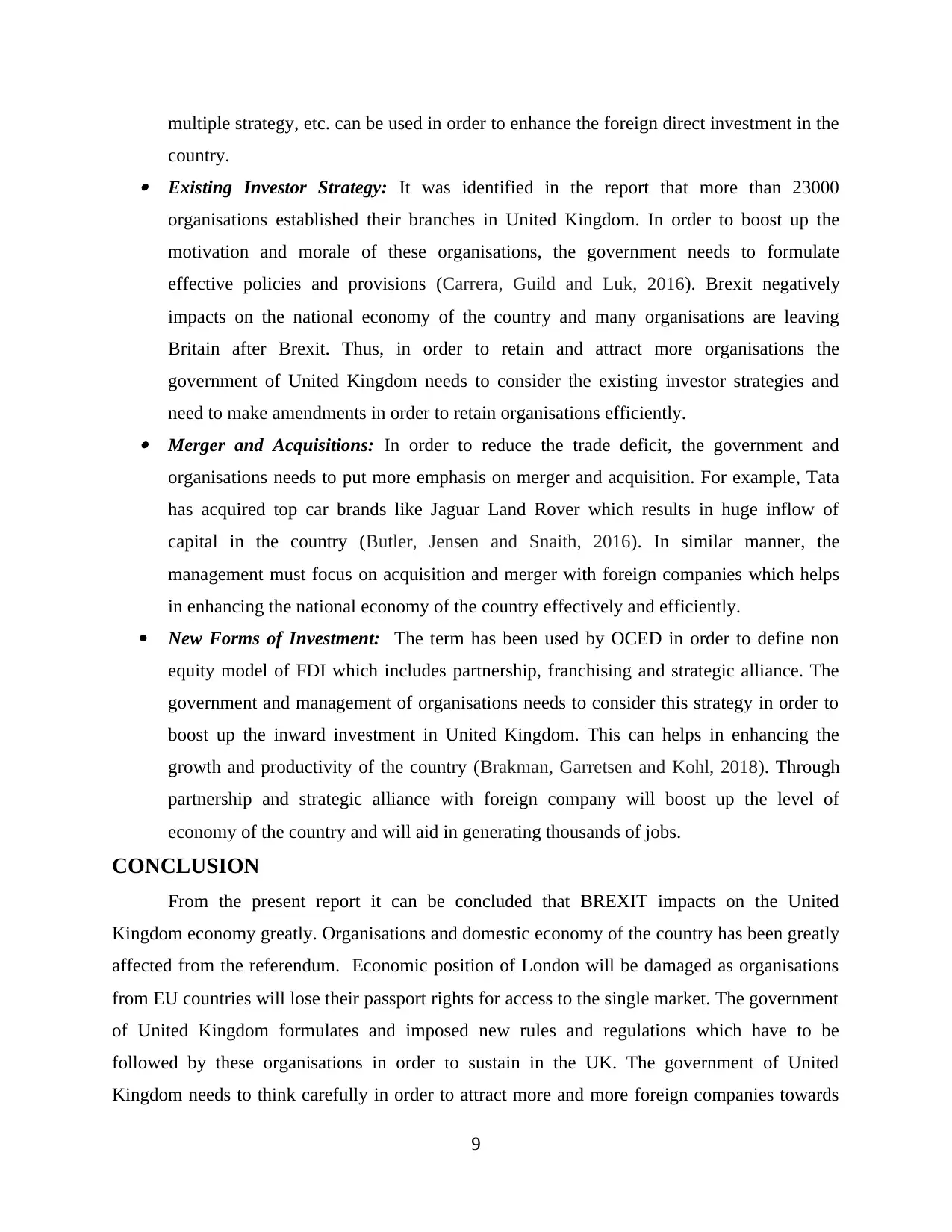
multiple strategy, etc. can be used in order to enhance the foreign direct investment in the
country. Existing Investor Strategy: It was identified in the report that more than 23000
organisations established their branches in United Kingdom. In order to boost up the
motivation and morale of these organisations, the government needs to formulate
effective policies and provisions (Carrera, Guild and Luk, 2016). Brexit negatively
impacts on the national economy of the country and many organisations are leaving
Britain after Brexit. Thus, in order to retain and attract more organisations the
government of United Kingdom needs to consider the existing investor strategies and
need to make amendments in order to retain organisations efficiently. Merger and Acquisitions: In order to reduce the trade deficit, the government and
organisations needs to put more emphasis on merger and acquisition. For example, Tata
has acquired top car brands like Jaguar Land Rover which results in huge inflow of
capital in the country (Butler, Jensen and Snaith, 2016). In similar manner, the
management must focus on acquisition and merger with foreign companies which helps
in enhancing the national economy of the country effectively and efficiently.
New Forms of Investment: The term has been used by OCED in order to define non
equity model of FDI which includes partnership, franchising and strategic alliance. The
government and management of organisations needs to consider this strategy in order to
boost up the inward investment in United Kingdom. This can helps in enhancing the
growth and productivity of the country (Brakman, Garretsen and Kohl, 2018). Through
partnership and strategic alliance with foreign company will boost up the level of
economy of the country and will aid in generating thousands of jobs.
CONCLUSION
From the present report it can be concluded that BREXIT impacts on the United
Kingdom economy greatly. Organisations and domestic economy of the country has been greatly
affected from the referendum. Economic position of London will be damaged as organisations
from EU countries will lose their passport rights for access to the single market. The government
of United Kingdom formulates and imposed new rules and regulations which have to be
followed by these organisations in order to sustain in the UK. The government of United
Kingdom needs to think carefully in order to attract more and more foreign companies towards
9
country. Existing Investor Strategy: It was identified in the report that more than 23000
organisations established their branches in United Kingdom. In order to boost up the
motivation and morale of these organisations, the government needs to formulate
effective policies and provisions (Carrera, Guild and Luk, 2016). Brexit negatively
impacts on the national economy of the country and many organisations are leaving
Britain after Brexit. Thus, in order to retain and attract more organisations the
government of United Kingdom needs to consider the existing investor strategies and
need to make amendments in order to retain organisations efficiently. Merger and Acquisitions: In order to reduce the trade deficit, the government and
organisations needs to put more emphasis on merger and acquisition. For example, Tata
has acquired top car brands like Jaguar Land Rover which results in huge inflow of
capital in the country (Butler, Jensen and Snaith, 2016). In similar manner, the
management must focus on acquisition and merger with foreign companies which helps
in enhancing the national economy of the country effectively and efficiently.
New Forms of Investment: The term has been used by OCED in order to define non
equity model of FDI which includes partnership, franchising and strategic alliance. The
government and management of organisations needs to consider this strategy in order to
boost up the inward investment in United Kingdom. This can helps in enhancing the
growth and productivity of the country (Brakman, Garretsen and Kohl, 2018). Through
partnership and strategic alliance with foreign company will boost up the level of
economy of the country and will aid in generating thousands of jobs.
CONCLUSION
From the present report it can be concluded that BREXIT impacts on the United
Kingdom economy greatly. Organisations and domestic economy of the country has been greatly
affected from the referendum. Economic position of London will be damaged as organisations
from EU countries will lose their passport rights for access to the single market. The government
of United Kingdom formulates and imposed new rules and regulations which have to be
followed by these organisations in order to sustain in the UK. The government of United
Kingdom needs to think carefully in order to attract more and more foreign companies towards
9
⊘ This is a preview!⊘
Do you want full access?
Subscribe today to unlock all pages.

Trusted by 1+ million students worldwide
1 out of 16
Related Documents
Your All-in-One AI-Powered Toolkit for Academic Success.
+13062052269
info@desklib.com
Available 24*7 on WhatsApp / Email
![[object Object]](/_next/static/media/star-bottom.7253800d.svg)
Unlock your academic potential
Copyright © 2020–2026 A2Z Services. All Rights Reserved. Developed and managed by ZUCOL.





